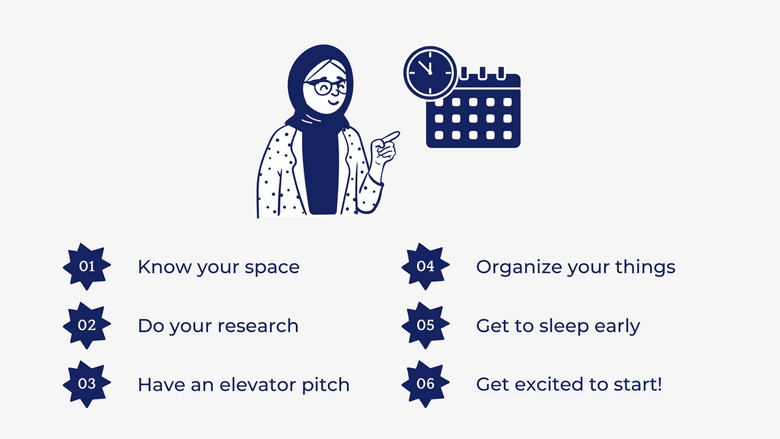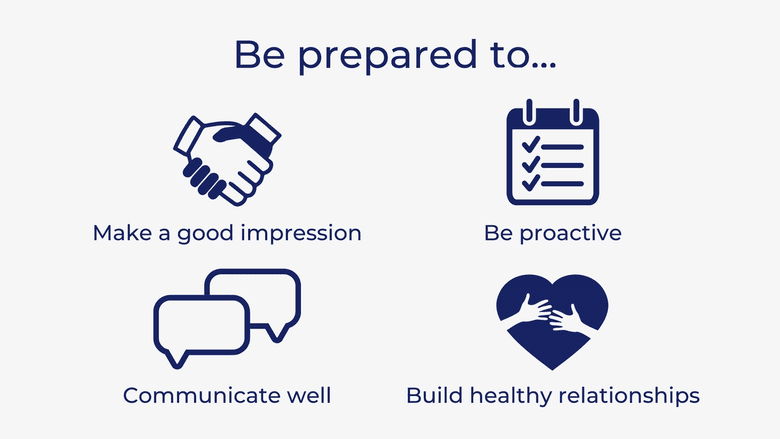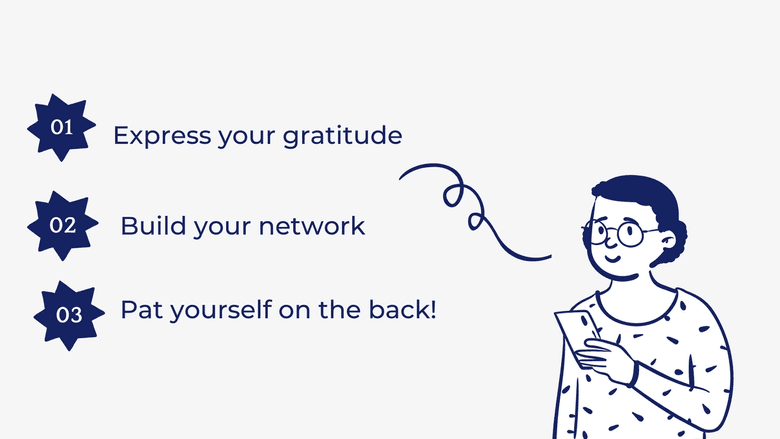Congrats on Your New Job! Here’s How to Ace Your First Day of Work
End your first day feeling confident and leaving a fantastic first impression on your coworkers!
Your first day at a new job is undoubtedly nerve-wracking. With a new organization, culture, colleagues and opportunities, it’s easy to get overwhelmed with all that’s going on. But it doesn’t have to be that way! With these tips in mind, you’ll end that first day feeling confident and leaving a fantastic first impression on your coworkers.
The Days & Night Before

1. Get Comfortable With Your Space
If you’re working at a physical office, visit the building to get a realistic idea of how long it takes to get there, and check basic things like where the entrance is — you don’t want to panic over getting into the office just minutes before you need to be at your desk!
If you’re joining the organization remotely, establish a spot for video calls beforehand. A quiet space with flattering lighting is ideal, as is a comfortable work environment that you wouldn’t mind sitting in for a few hours at a time. Planning out personal logistics in advance, such as where your kids will be while you’re on calls, will also be helpful in making your first day go as smoothly as possible.
2. Do Your Research
In the week leading up to your start date, do some research. Know your supervisors’ names (and pronunciations), as well as the information for human resources staff in case you need to contact them for help. Reaching out to the recruiter to learn about the general onboarding process in advance would also be helpful, so you can get an idea of what your first few weeks will look like.
You can research if there are any affinity groups you’d be interested in joining at the organization. For example, Google currently has 16 Employee Resource Groups that its employees can join, ranging from its Disability Alliance to Trans at Google. Connecting with colleagues with similar backgrounds and identities can provide a greater sense of belonging in your new workplace. You might be able to build relationships with mentors and friends that you may have otherwise not met.
3. Practice Your Elevator Pitch
Practice your elevator pitch a few times— you’ll be much more confident knowing what you’re going to say when you introduce yourself to your new colleagues, especially if you get the jitters when meeting new people. Think about what you want them to know most about you: your position, what you’re excited about, what you hope to learn at the organization? Have your 30-second pitch memorized beforehand.
4. Organize Your Belongings
The night before your first day, make sure to have everything — or, more realistically, most things — sorted out. Review the organization’s dress code and decide what you’re going to wear. Choose something that you feel confident and comfortable in! In the same vein, prepare your bag (or workspace, if you’re working remotely) for the next day. From stationary to your computer charger, having your belongings in one place the night before means there is less to worry about the morning of.
5. Get to Sleep Early
Finally, go to bed early and make sure to set alarms — and double check that you did. You don’t want to send the wrong message on day one by showing up late! Figure out your game plan for the morning, and anticipate arriving at the office early. Get a good night’s rest so you have all the energy you need to have a great first day.
On the Job

1. Make a Good First Impression
As a new employee, establishing a good first impression with your new coworkers is critical in building meaningful relationships with them. One study found that people can form first impressions in less than one-tenth of a second, so it’s important to look and feel your best so you can confidently put the right foot forward at your new workplace.
Arrive early at your office (or Zoom link), and if it seems socially appropriate, start introducing yourself to your new coworkers. If you’ve practiced your elevator pitch the night before, this shouldn’t be a problem! Make friendly small talk, learn about their roles and get a lay of the land.
2. Be Proactive
For a successful first day (and beyond), be proactive. From introducing yourself to your new boss to asking questions when you’re unclear on a task, showing enthusiasm and a strong work ethic is critical to long-term success.
Throughout the day, check in with your boss and make sure everything’s on track — maintaining good communication is critical to establishing good teamwork and relationships.
3. Communicate Well (Verbally and Nonverbally)
In meetings, nonverbal communication can send signals to others about your attitude. Being focused and maintaining open body language leaves a good impression of confidence and professionalism. Fight the urge to zone out or slouch, and keep a professional composure to impress your new employer from the start.
When you talk — especially on video calls — do so clearly and confidently. Speak up if you have an idea or question! Actively participating in discussions shows your excitement for and commitment to your new job.
However, it’s just as important to be an active listener. You don’t want to dominate the conversation and prevent others from sharing their ideas. Stay attentive, and if you’re building a list of questions to ask your teammates, double check that they haven’t been answered already so you don’t waste their time.
4. Start Building Healthy Relationships
Throughout the onboarding process, you might be able to meet fellow new hires. They’ll be looking to make connections as well, so make an active effort to reach out! They’ll be grateful that you did and you’ll be able to make new friends.
During breaks or lunch — when you aren’t disrupting work time — you can start connecting with your new coworkers, in person or on social media. Maybe you’ll find that you enjoy a certain artist or are fans of the same team, and you’ll be laying the groundwork for even more meaningful connections. Strike up casual conversations — you might even be able to get advice about your new job!
In light of COVID-19, it’s also important to clearly set expectations regarding your comfort with physical interactions early on. If you’re particularly anxious about the virus, establishing boundaries and communicating them clearly with your team members — rather than being dragged into in-person events later — will help build trust and comfort with your new organization.
End of the Day

Congratulations! You’re finished with your first day of work at your new job — almost. There are a few more things you should do to finish off the day.
1. Express Your Gratitude
Sending out thank you messages to your new coworkers — anyone that helped you navigate your new position — will further help build relationships at your organization. Show your appreciation through thoughtful, personalized notes that they’ll be happy to receive. Research shows that letters of gratitude can actually improve wellbeing for both the writer and recipient — so go ahead and start writing!
It’s also good to message your family and friends who supported you throughout the job search process. Let them know how your first day was, they’ll be happy to hear from you!
2. Build Your Digital Network
You can also begin connecting with your teammates on LinkedIn and grow your professional network. Make sure to add the personalized note to the connection invitation and show your gratitude and excitement to be joining the new organization.
3. Pat Yourself on the Back
Finally, relax! From preparing your cover letter to going through the difficult interview process to completing your first day, be proud of all that you’ve accomplished. Celebrate your incredible achievements — you deserve it.
The information provided herein is for general informational purposes only and is not intended to provide tax, legal, or investment advice and should not be construed as an offer to sell, a solicitation of an offer to buy, or a recommendation of any security by Candor, its employees and affiliates, or any third-party. Any expressions of opinion or assumptions are for illustrative purposes only and are subject to change without notice. Past performance is not a guarantee of future results and the opinions presented herein should not be viewed as an indicator of future performance. Investing in securities involves risk. Loss of principal is possible.
Third-party data has been obtained from sources we believe to be reliable; however, its accuracy, completeness, or reliability cannot be guaranteed. Candor does not receive compensation to promote or discuss any particular Company; however, Candor, its employees and affiliates, and/or its clients may hold positions in securities of the Companies discussed.
